The content of the article
The full name of the tea is Xi Hu Longjing, which is translated from Chinese means the Well of the Dragon from Xi Hu Lake. Tea gained worldwide fame thanks to its unique aroma and refreshing taste. Longjing green tea is rightly considered to be the hallmark of China, because it has long been a national drink.
Appearance story
There are several legends describing its origin.
One legend says: “Once upon a time, in the last millennium, near the temple, the Well of the Dragon lived the immortal highlander of Hangzhou, who had a dragon. For him, saint Hangzhou dug an unusual well where his dragon lived. The dragon was a sacred animal, because it could cause rain and other natural phenomena, it served only for the benefit of people. Therefore, the peasants worshiped the dragon and brought him all kinds of gifts and offerings. And before his death, the highlander revealed to people the secret of the holy well and the miraculous powers of Longjing tea. ”
The second legend tells that when digging a well in the village of Dragon Well, the inhabitants discovered a stone in the form of a dragon. Therefore, this well was accepted by the ancient Chinese as a shrine and guarded it.
Surprisingly, when brewing a drink, tea leaves begin to curl and spin, forming a funnel.
Even the emperors of the Qing Dynasty appreciated the divine drink, and even awarded it the high title of "imperial". Chinese emperors gave this tea to their officials as a sign of their location. To this day, the Dragon Well tea has not lost its significance. Even in our time, it is served on official visits to representatives of other countries. Therefore, in China there are still plantations for the cultivation of this variety, which belong only to members of the government. The territory of plantations is guarded by the military and is separated by a high fence.
And in 2004, English scientists were surprised by the results of a study of Longjing tea. Indeed, studies have shown that it contains a huge amount of antioxidants and vitamin C.
Taste characteristics
This special taste is remembered for a lifetime. It contains a deep buttery taste of honey and nut sweetness and floral astringency, echoing notes of spring freshness. Having such versatility of aromas, its smell is not sharp. When brewing tea is never cloudy. Usually it is emerald, gold or green-yellow - it all depends on its origin and time of collection.
Its characteristic feature is a sweet aftertaste, which occurs due to the high content of antibacterial substances. Having a high social purpose, unfortunately, it is rarely possible to purchase it, because the probability of buying a real lanjing on the world market is only 30%.
Beneficial features
- A cup of legendary tea instantly quenches thirst, charging the whole body with a huge charge of energy.
- Easily relieves hangover symptoms and strengthens the immune system. It is especially recommended for use during vitamin deficiency.
- Due to the high content of antioxidants, the drink has a strong anti-aging and anti-cancer effect on the human body.It also helps to overcome chronic fatigue, a breakdown.
- If you drink a cup of tea in the morning, then all day the mental processes and attention will not be replaced by a feeling of fatigue.
- In addition, tea helps strengthen the walls of blood vessels, which reduces blood pressure and the likelihood of cardiovascular disease. The elements found in tea contribute to lowering blood cholesterol levels, as they destroy fatty deposits on blood vessels.
- When drinking, the metabolism in the body is accelerated, the heart muscle is strengthened, and toxins are removed from the body.
- Due to the high concentration of antibacterial substances, tea prevents the appearance and development of caries.
- Since ancient times, the Chinese have widely used it in the treatment of various lung diseases.
- Older people who drink regularly are 50% less likely to get sclerosis.
How to brew a Dragon Well?
During the process of brewing divine tea, it is necessary to monitor the temperature regime of water, its temperature should be 75-80 degrees.
Proportionally, one must be guided by the fact that, based on 200-250 ml of water, 5 grams of tea is taken. Do not use pottery, only a porcelain or glass teapot. Metal or clay utensils can add undesirable shades to the taste palette of tea.
Tea drinking is a special art and ancient cult in China. Therefore, Chinese masters recommend, firstly, to tune in the process of making tea, for this it is worth breathing in the unsurpassed aroma of tea leaves. Water needs to be used soft, you can preheat it, but in no case boil it and then cool it to reduce stiffness. Secondly, the tea should be infused for at least two minutes, be sure the dishes in which it is infused should cool slightly. This serves as a signal for further brewing, because the whole process of making tea lasts 5-6 stages of brewing. Water needs to be drained. First brewing helps tea open faster. Next, after each brewing, drain the liquid and reheat it. The second and third tea leaves need to be infused for at least 10-12 seconds. The fourth and fifth - at least 25 seconds.
Also, Chinese masters do not recommend adding various flavoring and aromatic additives to tea. Only the serving of various sweets for tea is generally supported in Chinese traditions.
It is worth noting that Longjing green tea is one of the top ten popular teas in China. Its unique technology of cultivation, collection and storage classifies it with elite world-class drinks.
Production
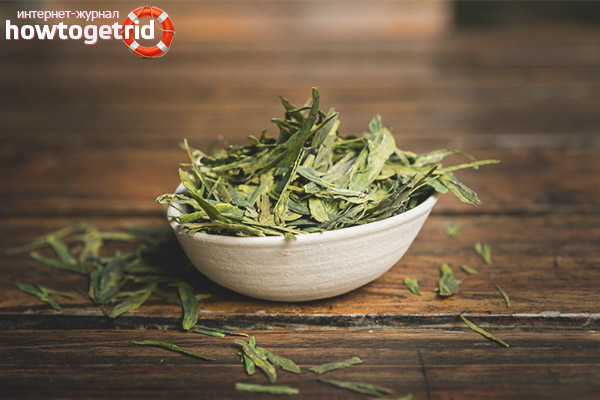
When collecting tea, take only the upper parts of the shoots and 2 adjacent leaflets. Processing technology is no less time consuming and lengthy. To maximize the preservation of aroma and valuable substances in it, it is dried in a special way. Each tea leaf is applied to a hot boiler, after which it instantly dries, and is ready for storage. Thus, using manual labor at all stages of the process, this tea is not subject to sorting, as it is initially of high quality. Using this processing technique, floral and fruit additives are never added to the composition of the brewing of this drink, because the rich taste and aroma of tea do not need it.
Longjing tea of the highest quality is harvested in China in April before the Qingming holiday, namely, in early spring, when the shoots of the tea tree are still very small, which serves as the guarantee of the highest quality tea. This is due to the fact that even in the era of emperors, it was cyamine that was the traditional time for tea collection for the ruler. Such tea is very difficult to get, not only because of its high cost, but also because it is sold out in advance. Therefore, manufacturers of such tea have very little time to collect valuable raw materials.
Other valuable Luangjing varieties are harvested just before the rainy season, which are called Ming Chian and Yuqian. That is why tea has, in addition to a rich rich taste and aroma, a rich palette of colors when brewing.
Contraindications
Contraindications should be attributed only to an allergy to the plant components of tea.
Video: how to determine the quality of shihu lunjin tea

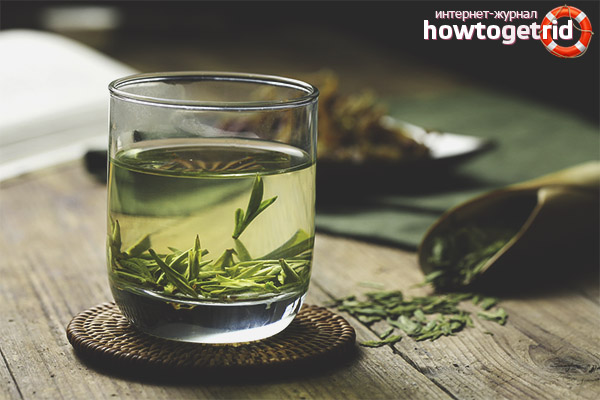
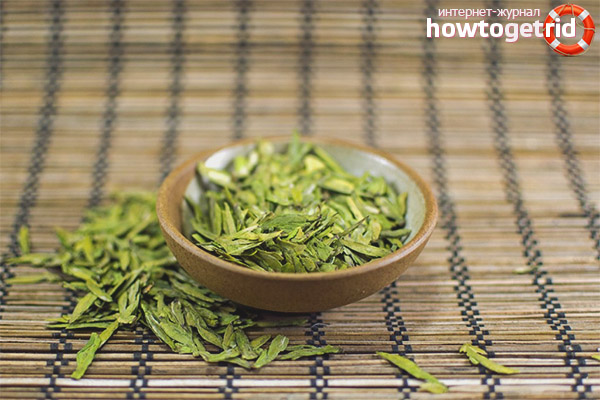
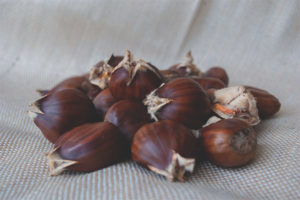
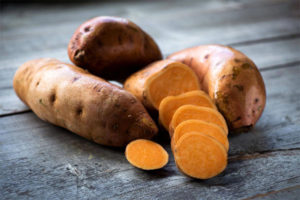
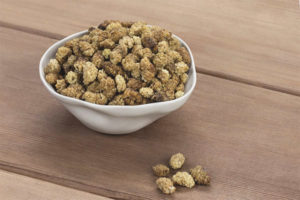
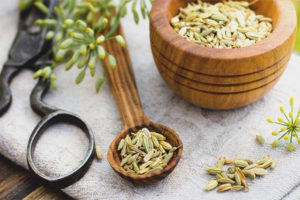
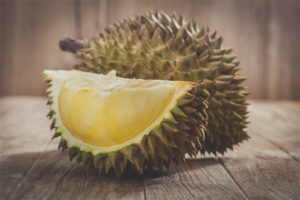
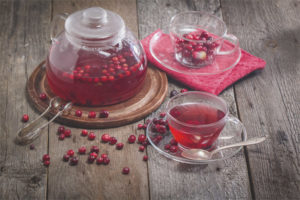
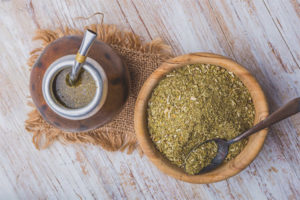
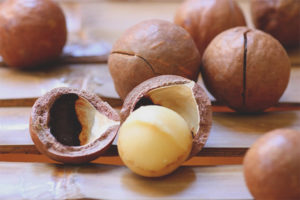
Submit